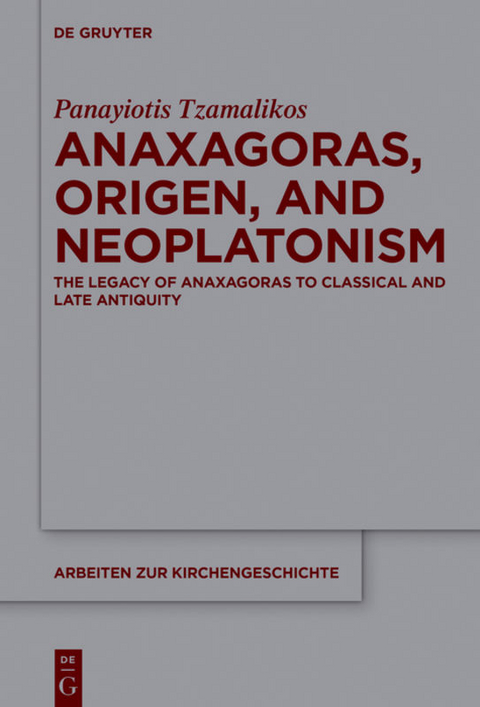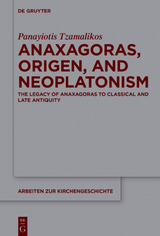Anaxagoras, Origen, and Neoplatonism
The Legacy of Anaxagoras to Classical and Late Antiquity
Seiten
2016
|
2 Bde.
De Gruyter (Verlag)
978-3-11-041946-7 (ISBN)
De Gruyter (Verlag)
978-3-11-041946-7 (ISBN)
Die seit 1925 erscheinenden Arbeiten zur Kirchengeschichte bilden eine der traditionsreichsten historischen Buchreihen im deutschsprachigen Raum. Sie enthalten Forschungen zur Kirchen- und Dogmengeschichte des Christentums aller Epochen, veröffentlichen aber auch Arbeiten aus verwandten Disziplinen wie beispielsweise der Archäologie, Kunstgeschichte oder Literaturwissenschaft. Kennzeichnend für die Reihe ist der durchgängige Anspruch, historisch-methodische Präzision mit systematischen Kontextualisierungen des jeweiligen Gegenstandes zu verbinden. In jüngerer Zeit erscheinen verstärkt Arbeiten zu Themen einer Kultur- und Ideengeschichte des Christentums in einem methodisch offenen christentumsgeschichtlichen Horizont.
Origen has been always studied as a theologian and too much credit has been given to Eusebius’ implausible hagiography of him. This book explores who Origen really was, by pondering into his philosophical background, which determines his theological exposition implicitly, yet decisively. For this background to come to light, it took a ground-breaking exposition of Anaxagoras’ philosophy and its legacy to Classical and Late Antiquity (Plato, Aristotle, Stoics, Origen, Neoplatonism), assessing critically Aristotle’s distorted representation of Anaxagoras. Origen, formerly a Greek philosopher of note, whom Proclus styled an anti-Platonist, is placed in the history of philosophy for the first time. By drawing on his Anaxagorean background, and being the first to revive the Anaxagorean Theory of Logoi, he paved the way to Nicaea. He was an anti-Platonist because he was an Anaxagorean philosopher with far-reaching influence, also on Neoplatonists such as Porphyry. His theology made an impact not only on the Cappadocians, but also on later Christian authors. His theory of the soul, now expounded in the light of his philosophical background, turns out more orthodox than that of some Christian stars of the Byzantine imperial orthodoxy.
Origen has been always studied as a theologian and too much credit has been given to Eusebius’ implausible hagiography of him. This book explores who Origen really was, by pondering into his philosophical background, which determines his theological exposition implicitly, yet decisively. For this background to come to light, it took a ground-breaking exposition of Anaxagoras’ philosophy and its legacy to Classical and Late Antiquity (Plato, Aristotle, Stoics, Origen, Neoplatonism), assessing critically Aristotle’s distorted representation of Anaxagoras. Origen, formerly a Greek philosopher of note, whom Proclus styled an anti-Platonist, is placed in the history of philosophy for the first time. By drawing on his Anaxagorean background, and being the first to revive the Anaxagorean Theory of Logoi, he paved the way to Nicaea. He was an anti-Platonist because he was an Anaxagorean philosopher with far-reaching influence, also on Neoplatonists such as Porphyry. His theology made an impact not only on the Cappadocians, but also on later Christian authors. His theory of the soul, now expounded in the light of his philosophical background, turns out more orthodox than that of some Christian stars of the Byzantine imperial orthodoxy.
Panayiotis Tzamalikos, Aristotle University of Thessaloniki, Griechenland.
Panayiotis Tzamalikos, Aristotle University of Thessaloniki, Greece.
"[...] Tzamalikos has a grasp of the ancient philosophical corpus, including the Aristotelian commentators who make up almost half of it, that is matched by only a handful of living scholars, none of whom could pretend to his equally comprehensive grasp of patristic literature. For this reason alone, his study demands our attention [...]"
M. J. Edwards in: Journal of Ecclesiastical History 2018, 610-612
| Erscheint lt. Verlag | 26.9.2016 |
|---|---|
| Reihe/Serie | Arbeiten zur Kirchengeschichte ; 128 |
| Verlagsort | Berlin/Boston |
| Sprache | englisch |
| Maße | 155 x 230 mm |
| Gewicht | 1534 g |
| Themenwelt | Geisteswissenschaften ► Religion / Theologie ► Christentum |
| Schlagworte | Aristoteles • Aristotle • Heidegger • Neoplatonism • Neuplatonismus • Origen • Origenes • Origen; Neoplatonism; presocratic philosophy; Aristotle; Stoicism • Plato • Presocratic philosophy • Stoa • Stoicism |
| ISBN-10 | 3-11-041946-7 / 3110419467 |
| ISBN-13 | 978-3-11-041946-7 / 9783110419467 |
| Zustand | Neuware |
| Haben Sie eine Frage zum Produkt? |
Mehr entdecken
aus dem Bereich
aus dem Bereich




